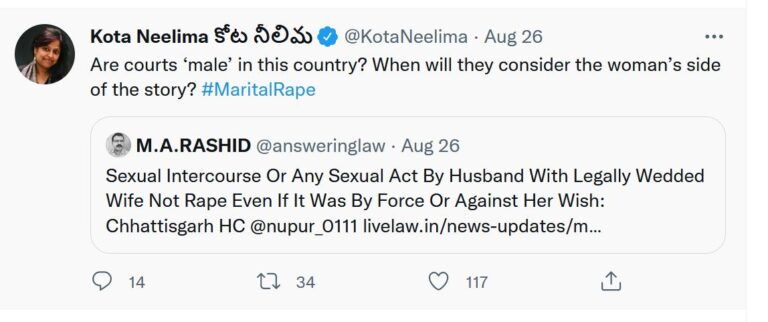
In India, a society rooted in patriarchal traditions, marriages are sacrosanct and it is not a crime for a man to rape his wife.
But in recent weeks, courts have given conflicting rulings on marital rape, leading to renewed calls from campaigners to criminalize rape within marriage.
On Thursday, Justice NK Chandravanshi of the Chhattisgarh high court ruled that “sexual intercourse or any sexual act by a husband with his wife cannot be rape even if it was by force or against her wish”.
The woman had accused her husband of “unnatural sex” and raping her with objects.
The judge said the man could be tried for unnatural sex, but cleared him of the much more serious offence of rape since Indian law does not recognize marital rape.
The ruling met with outrage on social media, including from gender researcher Kota Neelima who asked “when will courts consider the woman’s side of the story?”
Many responded to her tweet saying the archaic rape laws must be amended – but there were many contrary voices too.
One wondered “what sort of a wife would complain of marital rape?”; another suggested “there must be something wrong with her character”; while a third said “only a wife who doesn’t understand her duties would make such a claim”.
It’s not just social media, the contentious topic of marital rape also appears to have divided judiciary.
Just a few weeks back, the high court in the southern state of Kerala ruled that marital rape was “a good ground” to seek divorce.
“The husband’s licentious disposition disregarding the autonomy of the wife is marital rape, albeit such conduct cannot be penalized, it falls in the frame of physical and mental cruelty,” Justices A Muhamed Mustaque and Kauser Edappagath said in their 6 August order.
They explained that marital rape occurred when the husband believed that he owned his wife’s body and added that “such a notion has no place in modern social jurisprudence”.
The law that Justice Chandravanshi invoked is Section 375 of the Indian Penal Code.
The British colonial-era law, which has been in existence in India since 1860, mentions several “exemptions” – situations in which sex is not rape – and one of them is “by a man with his own wife” who’s not a minor.
The idea is rooted in the belief that consent for sex is “implied” in marriage and that a wife cannot retract it later.
But it has increasingly been challenged across the world and over the years, more than 100 countries have outlawed marital rape. Britain too outlawed it in 1991, saying the “implied consent” could not be “seriously maintained” nowadays.
But despite a long and sustained campaign to criminalize it, India remains among 36 countries where the law remains in the statue book, leaving millions of women trapped in violent marriages.
According to an Indian government survey, 31% of married women – almost one in three – have faced physical, sexual and emotional violence from their husbands.
The Indian government has consistently argued that criminalizing marital law could “destabilize” the institution of marriage and that it could be used by women to harass men.
But in recent years, many unhappy wives and lawyers have petitioned courts calling for the “offending law” to be struck down.
United Nations, Human Rights Watch and Amnesty International have also raised concerns about India’s refusal to do so.
Many judges too have admitted that they are hobbled by an archaic law that has no place in a modern society and called for the parliament to criminalize marital rape.
(BBC)






